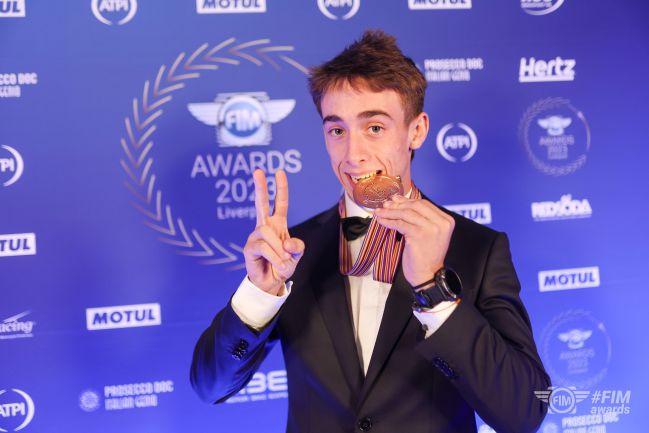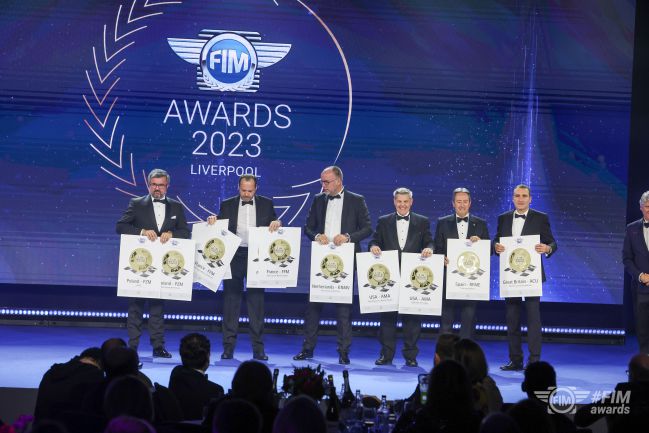By
“Without a doubt we are in a magnificent and unparalleled moment for Spanish motorcycling”, recognizes it Manuel Casado (Madrid, 64 years old), president of the Royal Spanish Motorcycle Federation (RFME, Zaragoza, 1923), and the figures demonstrate it. Of all the 119 national federations spread around the world, the Spanish one has been the second with the highest representation (only surpassed by Great Britain) in the last FIM gala where the best of 2023 were recognized. Pedro Acosta in Moto2, Jaume Masia in Moto3, Alvaro Bautista in SBK, Ángel Piqueras in JuniorGP, Jorge Prado for the first time in MXGP, Toni Bou in another double of TrialGP and X-Trial and Josep Garcia in Enduro, they were “the great champions that we have in our country once the season is over” on an individual level. Because his own Bou, along with Busto and Marcelli They added a new collective title with the men’s nations trial.
The present speaks a lot and well about the good health that Spanish motorcycling currently enjoys, but all these merits are the result of work that began long ago 100 years. The centenary of the RFME is celebrated with the sport immersed in a kind of permanent golden age and a long list of successes that began in 1969 by Ángel Nieto. Teacher achieved the first world title for Spain in the 50 cc category that was part of the World Speed Championship but, above all, it started a legacy that made him a reference the one everyone wanted to be like. And, although each one has done it in their own way, many have achieved it.
Since the 12+1 times champion opened the scoreboard, the number has not stopped adding. Spain enjoys an unmatched track record that covers all motorcycling specialties: 181 individual titles in championships and world cups, 50 team titles national and more than 1,300 victories in world-class tests are the figures of a long list of successes that already await those to come. Because as Manuel Casado recalls, beyond the big names already mentioned, “another series of drivers who at a junior level, younger, are already winning European or world titles and “they assure us to a certain extent the continuity of Spanish motorcycling”.

Enlarge
Pedro Acosta receives the MotoGP World Champion medal from the FIM.
FIM
There is a present and a future, but above all a past that Casado highlights as the architect of everything we are experiencing today: “In this moment of so much victory, I believe that the work of many years that this federation has carried out and on this anniversary, where We celebrate 100 years since the RFME was created, Well, we are super happy and grateful for the AS sports award which serves as recognition of our entire career.” Because, although only the joys are highlighted, the process was not without bumps along the way.
“These 100 years of experience belong to many people”
It was not easy to reach the current results in disciplines such as speed, because the highest category of the World Championship was for a long time territory forbidden to Spanish pilots. For a long period it was the Americans and Australians who played the leading role, while Sito Pons was the first stone of success in 500 cc, championship where Alex Criville It culminated a decade of extraordinary efforts with the title of the maximum displacement in 1999. A milestone that allowed Spanish motorcycling to face the new century full of hope.
In addition to the achievements, that hope was also established thanks to all the work carried out at that time by the RFME. Were created promotional cups that ended up becoming shuttles of drivers to all the world championships. Especially in the case of the ESBK, which currently has participants from 35 different nationalities. A figure that exceeds that of the world championship thanks to all the past work, because as Casado remembers, “these 100 years of experience belong to many people and not just those of us who are now in the federation. They are part of the effort of everything motorcycling at different levels and of course, the riders who “They are the ones who are there showing their faces and breaking their chests for us.”

Enlarge
Manuel Casado receives recognition from the FIM.
FIM
“This complex of different people who Fform motorcycling and during this long time it is what has allowed us arrive with pride and with great satisfaction to this unparalleled date, because there will not be another centenary that we see as it has been to celebrate 100 years with the RFME. We hope to continue in this line and I am sure that with the future and the young people we have, we will be able to maintain ourselves at this high level,” or at least, that is the desire of a federation that “hopes not to let you down.”
